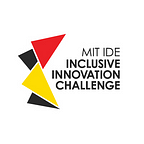Inclusive Innovation in Action — A Recap of the IIC Showcase
Last month the MIT Initiative on the Digital Economy hosted the On-Demand Economy Conference, which featured a showcase for the Inclusive Innovation Competition. There, exemplar organizations representative of the types of applicants we seek to identify and celebrate in the Competition pitched their inclusive solutions.
The following are among the types of organizations that are inventing a more inclusive, productive, and sustainable future for all.
First up was The Working World (@workingworldorg), which is representative of the work we are recognizing in the New Models category. Its plan for shared prosperity involves democratizing capital through investment in workers and helping workers build business through pragmatic training. By decentralizing investment finance, their operating premise is that worker-owned companies are better for workers, for worker relationships, and even for higher investment in technology because workers who own capital are more economically secure. Starting in Argentina, and then expanding to Nicaragua and the United States, The Working World’s Executive Director Brendan Martin presented an example of how new operational practices and business models can revolutionize the existing labor market.
Next, Michael Colonnese, the President and Co-Founder of Work America (@Work_America), presented his startup’s work in the Matching category. Work America’s partnerships with one-third of all U.S. community colleges have helped the organization successfully build the “LinkedIn” for skilled labor, which serves as a platform for sharing student profiles with employers. Given that half of all open job opportunities are in the skilled trades, as many as 40 million workers stand to gain better access to employment opportunities through this pairing of education and employment for certified skilled labor.
Blendoor (@blendoor)’s Founder Stephanie Lampkin presented a different take on the Matching category. The Blendoor app offers employers a blind recruiting mechanism to better enable them to avoid unconscious bias and to conduct truly merit-based job matching. The app also offers skills development recommendations to job-seekers on the Blendoor platform. Blendoor’s approach to facilitating diversity recruiting is an exciting new solution to address the lack of diversity in tech, and has already gained the attention of 55 companies that have signed up to use the beta product.
Natalie Kuldell introduced BioBuilder (@SystemsSally), of which she is President, Founder, and Executive Director. BioBuilder is an exemplar of the type of work we are seeking to identify in the Skills category. The organization builds young people’s capabilities and interest in science in a way that is connected to the goals and roles of industry by offering to secondary school science classrooms a curriculum that is informed by university-level research. Through online education students are empowered to be part of solutions to society’s challenges in the digital era.
General Assembly (@GA) is a well-known leader in the Skills space, seeking to increase income through training in in-demand skills in data, design, business, and technology. GA’s Director of Social Impact, Tom Ogletree, presented the strong results of their programs, such as a 20–30% increase in wages, 99% job placement within 180 days, and high starting salaries of $65–85K. GA is currently undertaking a number of other interesting initiatives such as scholarships targeting groups which are underrepresented in tech, providing skills-based credentialing, and partnering with workforce development nonprofits to increase access to GA programs. GA is a compelling example of how organizations can confront the skills gap, better preparing our workforce for opportunities of the future.
Finally, Unlimited Labs (@UnlimitedLabs)’s CEO and Co-Founder Nitesh Banta provided a peek at how humans can unlock the power of machine intelligence to organize the way we work. Their company is focused on developing “human-assisted artificial intelligence” software, and their open source tool Orchestra advances this goal through automation and coordination of expert teams to produce complex creative and analytical projects. Their mission of “humans where they’re best, machines for the rest” exemplifies well the type of solutions we are seeking in our Humans + Machines category. We look forward to the launch of their first product, built on top of the Orchestra platform, coming out in a few months!
This is just a small slice of the rapidly evolving landscape of organizations that are using technology to ensure that all members of our society are brought along into a brighter future.
Is your organization creating economic opportunity in the digital era?
Tell us about it by registering on our Competition site.
Contributors: Susan Young, Lillian Chen, Devin Cook, and Shannon Farrelly
